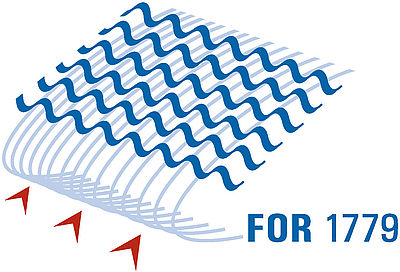Symposium Feb. 2014
In 2011 the German Research Association (DFG) launched a research group on "Active Drag Reduction via Wavy Surface Oscillation" which combines scientists from the fields of control theory, fluid mechanics, metal forming, and electronics. The main long-term objective of this program is the development of a simple, yet energy efficient method to influence the turbulent boundary layer such that drag is minimized reduction by active or a combination of active and passive means. To satisfy this goal 7 projects have been defined in the different areas of control theory, fluid mechanics, metal forming and electronics. In each of these projects scientists collaborate in several experimental and numerical investigations to improve the fundamental knowledge of the underlying physical mechanisms of drag reduction, a possible control approach, and the feasibility in terms of manufacturing such an actuated system.
First announcement and general information:
Symposium about Active Drag Reduction
An interdisciplinary symposium organized by the DFG funded research group FOR1779, RWTH Aachen University and FZ Jülich
20-21 February Novotel Aachen
- 1. Day: Symposium 8:30 a.m. until 5:00 p.m.
- 2. Day: Symposium 8:30 a.m. until 2:00 p.m.
Detailed Program: Flyer

Organizing Committee:
- Wolfgang Schröder
- Dirk Abel
- Wolfgang Dahmen
- Siegfried Mueller
- Gerhard Hirt
- Tilman Beck
- Lorenz Singheiser
- Sepfan van Waasen
- Michael Schiek
Invited external speakers:
- Prof. Yu Zhou, Shenzhen Graduate School, Harbin Institute of Technology: Surface-perturbation-based drag reduction in a turbulent boundary layer
- Prof. Kwing-So Choi, University of Nottingham: Spanwise travelling waves for turbulent skin-friction drag reduction
- Prof. Michael Leschziner, Imperial College London: On the turbulence physics underpinning friction-drag reduction by oscillatory wall motion - lessons derived from DNS
- Prof. Sergei Chernyshenko, Imperial College London: Recent progress in theoretical research on turbulent drag reduction
- Dr. Nikolas Goldin, TU Berlin: Active drag reduction in laminar flows using direct and biomimetic methods
- Dr. Oksana Stalnov, University of Southampton: Utilizing AFC technology to improve aerodynamic performance: feasibility and application
- Prof. Herwig Mayer, Boku, Institute of Physics and Material Science: VHCF properties of aluminum alloys measured with ultrasonic testing equipment
- Dr. Elfriede Friedmann, Heidelberg University: Drag predictions for tough surfaces from homogenized near-wall models of turbulent flow
- Dr. Catalin Nae, National Institute for Aerospace Research, Romania: Drag reducing effects using piezo-actuators in transonic flows
- Isabell Gradert, Airbus: Multifunctional Coatings for Low Drag Aircraft
- Oliver Rohr, EADS: Multifunctional Coatings for Low Drag Aircraft
- Joachim Zettler, Apworks EADS: Advanced forming technologies for next generation aircrafts